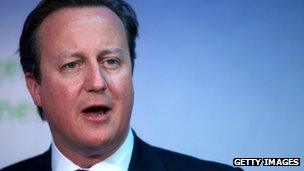Cameron ruffles UKIP's 'comfort blanket'
- Published

Big Englander? David Cameron used "triangulation" to take on UKIP - and Labour
Is David Cameron feeling his way towards an argument that he might use against UKIP?
I only ask because of some of the language he used in his speech in Essex this morning. He deployed the classic politician's device of presenting a choice of two policy options: to hide away from the world or embrace globalisation unthinkingly.
His answer, not surprisingly, was to steer a course between them. (For aficionados of Westminster jargon, this is known as triangulation, but this is not a word that should be used in polite company. Or the pub.)
Yet when the prime minister set out the first of these two arguments, there was a glimpse of an argument that could well be deployed against UKIP - even though he did not mention the party by name. Let me give you a few examples.
He described the first argument as a "stop the world, I want to get off" approach. He spoke of a "rejection of the modern world", people who were "wary to engage with the world".
'Comfort blanket'
He said: "There are those who say we should turn our backs on the world and on our wider obligations, that we should cut ourselves off from influential organisations in the belief that we can go it alone.
"I know how appealing some of these arguments are but they amount to the same thing: denial. Denial of a world where our young people are competing for jobs with graduates from California to Tokyo, where a revolution thousands of miles away can affect the guy filling up his van at a service station."
He spoke later against those who offer easy answers where there are none, such as "those who offer the comfort blanket of British destiny - as though we'll always just muddle through. The truth is that today, for our country, there is no such thing as destiny, only our determination to succeed."
Stop the world, I want to get off? The comfort blanket of British destiny? Denial? All this is the kind of stuff that could easily be aimed at a party whose raison d'etre is the independence of the UK. The clue is in the name.
Yet then Mr Cameron did something more subtle. He outlined the second of the two arguments - the opposite of the first - what he called "the unquestioning embrace of globalisation" of which he said the last Labour government had been guilty.
He said: "We're familiar, too, with their frankly patronising approach to those who may disagree. 'You're a Little Englander' they say. 'You don't get the modern world'. This approach - largely pursued under the last government - didn't feel too good for ordinary people - and frankly it didn't do too much for our competitiveness either. We saw mass, uncontrolled immigration changing communities in a way people didn't feel comfortable with, putting huge pressure on public services. We saw large bureaucracies like the EU having a huge impact on our way of life in a way no one voted for, while at the same time burdening our businesses with red tape and regulation."
In this one paragraph, the prime minister associated himself and the Conservative Party with all those voters worried about uncontrolled globalisation, including many who back UKIP, people who have been accused of being a "little Englander" for fearing immigration.
For weeks we have been wondering how the government might fight back against UKIP without matching it policies. Perhaps we now know.
Post script: I once sat on the next door table to Margaret Thatcher in a restaurant in Blackpool. She was with her husband, Denis, and a few supporters. One arch Eurosceptic Tory MP - he knows who he is - lent across the table and moaned to her: "Oh, Margaret, they keep on calling me a little Englander."
She lent over the table, placed her hand over his hand, looked deep into his eyes, and said in that utterly familiar husky voice: "There's no such thing as a little Englander. Only a big Englander."
Update 5pm: UKIP has now responded to Mr Cameron's speech. The party leader Nigel Farage has said the UK would have greater influence in the world if it were independent and no longer an EU vassal.
"Cameron talks about a global marketplace, yet he wishes to continue to shackle us to the EU, a declining trading block," he said.
"Britain needs to be free to set its own trading relationships with the rest of the world. In recent weeks non-EU members Iceland and Switzerland have set up free-trade deals with China. The EU hasn't. Our trade with the rest of the world is growing, their economies are growing. Isn't it time Mr Cameron took off his Brussels blinkers and embraced the future?"
And so, battle is joined.